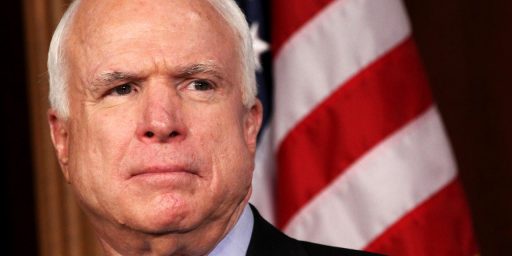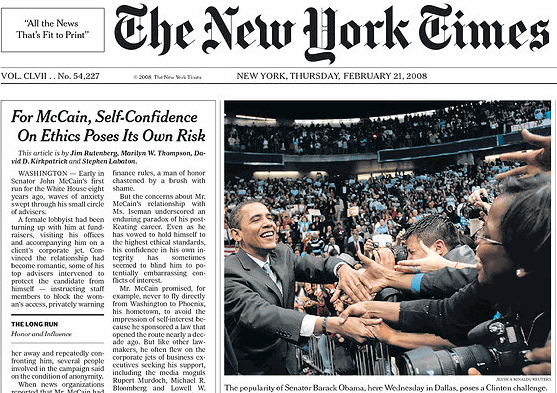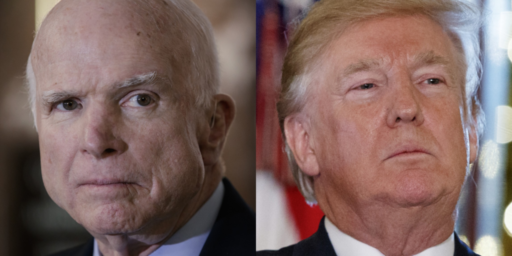Gas Tax Demagoguery
Kevin Drum, upon learning that Hillary Clinton has joined John McCain in calling for a suspension of the federal gas tax as a campaign stunt:
I’d say there’s approximately a zero percent chance that Hillary Clinton or John McCain actually believe this is good policy. It would increase oil company profits, it would make hardly a dent in the price of gasoline, it would encourage more summertime driving, and it would deprive states of money for transit projects. Their staff economists know this perfectly well, and so do they.
But they don’t care. It’s a way to engage in some good, healthy demagoguery, and if there’s anything that the past couple of months have reinforced, it’s the notion that demagoguery sells. Boy does it sell.
Quite right. There’s a famous quote from Richard Nixon explaining why he imposed wage and price controls despite knowing it was bad economics that’s appropriate here. Unfortunately, I can’t recall it or find it via Google.





Well, there’s this:
Excerpt from The Commanding Heights by Daniel Yergin and Joseph Stanislaw, 1997 ed., pp. 60-64.
Perhaps replace ‘economic’ with ‘political’ in the last sentence?
Sam: Yeah, I found that one. There’s a funnier, more cynical version, that basically says “It’s voodoo but sometimes you have to give the people what they want.”
James, I learn to my chagrin that I’ve independently used the same title as both you and Kevin Drum for essentially the same reaction to the matter. I guess I’m going to have to get more creative. 😉
Yeah. You know the first thing that leapt to my mind was George Wallace’s remark, upon losing an election, that his opponent “outsegged” him. Wasn’t gonna let that happen again.
McCain’s proposal is not just the tax but also a suspension of purchases for the strategic reserve. That would do more good than the tax suspension in my opinion.
If they considered releasing some of the oil in the reserve we could see a price drop and perhaps see the commodity speculators move their money elsewhere causing a further drop.
The fact that Clinton and McCain can get away with this pandering points to the lack of understanding of economics by a large section of the public.
Every time the price of gas goes up some lib wants to tap the oil reserves. Many of which also say that new oil explorations in places like Alaska and the Gulf would have little impact so we don’t need to do it. Clinton tapped the oil reserve many times and depleted them greatly. Bush has been replenishing them and using the reserves more like they were design. What would happen if Iran and Chavez decided to cut off oil and we didn’t have the reserves stock up? People like Steve would be screaming why isn’t the reserves stock full.
We would buy it from someone else, at pretty much the same price as we would have paid Iran and Venezuela. See if Iran and Venezuela aren’t selling to the US, they have to sell more to other countries. If those other countries are buying from Iran and Venezuela, they’re not buying from Saudi Arabia, so whatever oil they would have purchased from Saudi Arabia is now available for the US to buy.
The only way Iran and Venezuela could hurt the US would be to stop exporting oil to anyone, thereby causing an actual decrease in supply. This would hurt them substantially more than it would hurt us.
I love these sets of quotes:
http://news.yahoo.com/s/nm/20080430/pl_nm/usa_politics_gastax_economists_dc_1
So, she’s so “in touch” with ordinary Americans that she’s going to do something so outrageous as “pumping gas at a gas station” to draw their attention. It’s a good think she’s not elitist.
I didn’t explain very well what I meant by cutting off US oil. I use Iran and Chavez as example of two hostiles. Beside their own production there are things the two can do. Iran can impede at least temporary the transport of 30% of the world oil supply by shutting down the Strait of Hurmuz. Chavez with his build up of his Navy including submarine fleet can cause havoc in the Gulf of Mexico where we get much of our oil supply. Not only can he target oil tankers headed for the US but he could take out Oil platforms. There is the means of using Special Forces and/or terrorist groups to disrupt oil supplies that could be done without actual overt hostile acts by their government. There are many scenarios where they may want to do this. The chances of them committing such hostile actions are slim but not outrageously so. Their effort would only be successful temporary. I believe the US would bring stability for the most part within six months. Of course US oil supply for six months would greatly be reduced. How much oil supply is the oil reserve design for? It won’t help much if the oil reserves are mostly empty.
Wayne,
A possible scenario, but I don’t see any motivation that would lead Iran and Venezuela to even try such a suicidal act. As you said though, they couldn’t maintain the operations for any length of time, and 6 months is much longer than I would give them, especially on the Strait of Hurmuz.
Combine that with the fact that in-transit oil would not be effected by either, plus the alternative routes available, and I don’t see them being able to cripple the USA for any amount of time. It would, of course, lead to permanent international intervention at Hurmuz, and the dismantling of Venezuela’s navy, to say nothing of the complete removal of both governments.
It’s an interesting military exercise, but I don’t think we need to start laying the foundation for defending against it.
Wayne, Let’s start by establishing I am not liberal. Most of the comment readers will vouch for my conservative nature.
I understand your point but would offer that the reserve was established to counter any oil embargo but also to counter unusual price fluctuations that could harm the economy. We have that situation now so using the reserve to establish market stability fits well within the mission of the reserve program.
I whole heartily agree the liberals have left us in pickle by not allowing full access to the proven and potential reserves we have here at home. Short sighted environmental policies that do little more than make us feel good are a hallmark of the left. For every clean, efficient, and safe well we do not drill you can expect a polluting, inefficient, and dangerous well to be drilled somewhere else in the world. Usually in a country ran by a dictator or junta of some sort.
The solutions to our problems here are many and diverse. Basically we should think short term and long term about supply. We should conserve where we can. We should let the free market take hold and let alternatives develop (like nuclear). We should use market tools to rid ourselves of the speculators preying on us. We should remove many of the regulatory burdens for refinery construction and oil exploration/development.
I find no fault in filling the reserve at the right time and applaud the President for doing so but I also know now is a good time to cease filling (it’s almost full anyway) and maybe release some.
I welcome your comments.
Michael
Many didn’t feel the need to plan for a 911 type of event when some knew it would happen sooner or later. Of course we can’t prepare for everything but should prepare with enough flexibility to handle as much as reasonable. US Oil supply will be greatly impeded sooner or later. Maybe not by Iran and Chavez but by someone and it would be foolish not to be somewhat prepared.
Steve
If there were major supply disruptions that cause this increase in gas prices, I would agree with you. If we couple the release with a sudden allowance to increase domestic production, I would agree. However in the past the reserves were used to kick the can down the road and it just keep getting worst. The quicker we are force to face the problem the easier it will be to solve it and the less harm it will do to our economy. I agree with most of what you said. Conserving is “part†of the solution but people need to get off their high horse with suggestion like “wear a sweaterâ€. That is about the only thing reasonable Carter ever said.
Wayne,
I should mention I own a trucking company so my interest in fuel prices is very keen. Relief in any form appeals to my instincts.
I have taken steps to reduce my fuel usage by turning down top speed, reducing idle time, and double checking routes in order to minimize miles. But like we both said it will take more in terms of exploration and development around the world and especially domestically if we want to see lower prices.
I would argue that speculative interference has become not a supply disruption but a market disruption worthy of government remedy. At the very least cessation of purchases for the near full reserve.
The longer OPEC nations enjoy the high prices the more likely they will advocate keeping them high. A few years ago the Saudi oil minister talked of being comfortable with oil above $50 a barrel. Now he seems comfortable with it above $100. We need to get it down fast to prevent long term damage.